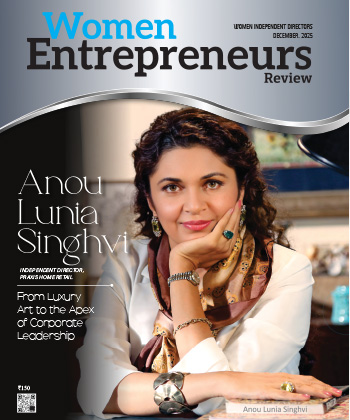
The Impostor Syndrome
By: Sandhya Biswas, Country Head - Marketing, Morphy Richards
I’m addicted to podcasts, and I was listening to one by Guy Kawasaki, the famed product evangelist and marketer, called Remarkable people. He mentioned having over a 100 guests on his podcast, nearly half of them being women, incredible, remarkable women.
Guy remarked, noting that all the women he interviewed talked of having Impostor syndrome but none of the men even brought it up once.
What is it that makes women leaders and women professionals question whether they even belong at the table?
Many of us have had experiences where an idea we’ve shared is glossed over but minutes later the same idea finds acceptance when someone else says it. In that minute, it’s easy to question everything you know, have achieved and accomplished and become a pile of stammers.
I’ve myself been in this situation many times, questioning myself whether I’m worthy of being where I am. Leadership is a privilege that I don’t take lightly but I’ve been at the end of days where I’ve questioned every action, replayed every move in my mind.
Self doubt is a normal emotion, healthy even. To believe yourself capable of error is probably a redeeming feature in any leader, manager of people etc
So what does one do when the Impostor Syndrome comes knocking. Here’s a few things you can do.
1. First acknowledge your feelings – this helps put a distance between you and the feeling, once you label it, you can externalize it. Being an observer of your emotions -good or bad is at the heart of being detached from an emotional reaction.
2. I’ve often found this next step pretty useful, make a list of achievements – a resume highlight if you will that captures your achievements and accomplishments – read through it. Keep this list short and like a code of sorts – one that you can understand.
3.Believe you’re there for a reason. You’re in the minority, maybe the only woman in that room. There is a reason you were included. Lean into what makes you different. If its your fine arts background in a room of metrics and numbers, share your perspective and experience. That is precisely the reason you’re on that seat.
4. Prepare, over-prepare and then prepare some more. I’ve found the best antidote to anxiety and self doubt in preparation. Anticipate questions, practice responses, be a nerd.
5. Practice for bigger stakes. Practice in smaller settings, smaller meetings, volunteer groups– get used to speaking up, making a point, disagreeing and adding to the discussion. The time you spend in honing your skills – listening, working with people, adding perspectives to a discussion – they all add up to building your skills bank.
6. Volunteer your time and skills – giving your gifts and time helps in gaining a unique perspective and confidence. Known as the helper’s high, it can help with feelings of gratitude and contentment, all of which feed into a stronger sense of self.
7. Give up pleasing – I struggle with this one too, we’ve often been brought up to respect authority and please those around especially above us in hierarchies. When making a point in the meeting or in a conference call, how many of us think of the number of people who will judge what we’ve said and have then self-censored?
The way out of this – consider how little time they’ve spent thinking of you. Your opinion of you matters a lot more than a stranger’s opinion of you. In your scheme of things, you are the key stakeholder, the prime mover, the CEO of your personal brand. If you’re ok with your point, make it.
And lastly, when in doubt, recall this Michelle Obama quote -
"I have been at probably every powerful table that you can think of, I have worked at non-profits, I have been at foundations, I have worked in corporations, served on corporate boards, I have been at G-summits, I have sat in at the U.N.: They are not that smart."- Michelle Obama
Most Viewed
- 1 Women's Health Startup HerMD Closing Doors Amid Industry Challenges
- 2 5 Famous Women in Indian Armed Forces
- 3 Saudi Women No longer Require Male Permission for Clothing Choices, says Prince MbS
- 4 Kolkata Medtech Startup Innovodigm Raises Rs 5.5 Crore Seed Funding Led by IAN Group
- 5 Yamunanagar's Kashish Kalra Honoured after Securing 111th Rank in UPSC Civil Services Exam
- 6 Madurai Appoints Its First Woman Corporation Head
- 7 IAS Vijayalakshmi Bidari Appointed as the new Nagpur Divisional Commissioner
- 8 American Entrepreneur Lucy Guo Overtakes T Swift to become Youngest Female Billionaire
- 9 ICC Women's World Cup 2025 Trophy Showcased at Indore's Holkar Stadium
- 10 Aparna Saxena's Beauty Venture AntiNorm Launches in India
- 11 Vidya Nataraj Co-Founded BlueStone Jewellery & Lifestyle files IPO
- 12 5 Women Freedom Fighters of India
- 13 Dr. G Krishnapriya appointed as CEO for Trichy
- 14 M3M & Sirona Partner to Introduce Menstrual Hygiene Vending Machines in 15 Locations
- 15 Punjab Govt launches SHE Cohort 3.0 Supporting Tech-led Women Startups
- 16 Indian origin Lawyer, Sweena Pannu appointed as the US New Superior Court Judge
- 17 The Aurora Tech Award recognizes 4 Indian Women-led Startups
- 18 Kerala's Republic Day parade featured an all-female tableau
- 19 Manisha Kabbur Becomes Karnataka's First Woman International Karate Coach
- 20 Director K. S. Ravikumar's Daughter Maalica Ravikumar Launches Life Coaching Company 'Evergrowth Academy' for Women
- 21 Leezu's Raises Pre-Seed Funding to Accelerate Growth in Sexual Wellness Industry
- 22 Sattu: Super-easy summer drink for PCOS gut healing
- 23 Swathi Nelabhatla creates Sitha App, India's First Women-Exclusive Gig Platform
- 24 7 Timeless Female Kathak Dancers & their Iconic Legacies
- 25 Meet 7 Iconic Women Architects of Modern India & their Most Impactful Work
- 26 This Woman-led Insuretech Startup is Helping Bridge the Education Financing Gap in India
- 27 Women Leaders Share Lessons Learnt from India Women's WC Win
- 28 5 Enterprising Women Founders Powering Singapore's Tech & Innovation Landscape
- 29 4 Women. 4 Stories. One Vision for Smarter, Stronger Healthcare
- 30 Global Gender Gap Narrows to 68.8%, But Full Equality 123 Years Away: WEF Report 2025
- 31 Changemakers: 7 Women Entrepreneurs Taking the Make in India Movement Forward
- 32 Meet Lucy Guo, The Youngest Self-Made Female Billionaire Disrupting Tech
- 33 How Women are Driving India's Festive Online Shopping Surge






